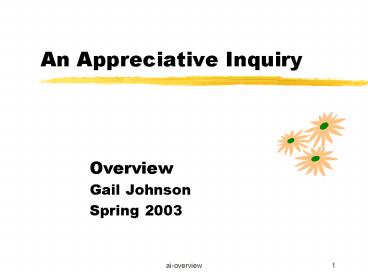An Appreciative Inquiry - PowerPoint PPT Presentation
1 / 19
Title:
An Appreciative Inquiry
Description:
ai-overview. 4. Assumptions ' Organizations gravitate toward a positive ... ai-overview. 7. The Steps ... appreciative-inquiry.org/AI-Life.htm. Hammond, Sue ... – PowerPoint PPT presentation
Number of Views:62
Avg rating:3.0/5.0
Title: An Appreciative Inquiry
1
An Appreciative Inquiry
- Overview
- Gail Johnson
- Spring 2003
2
What Is It?
- A framework for creating an imagined future that
builds on the most positive and vital elements of
the organization - Appreciative Inquiry is a process to learn from
success - What works well?
- Why it works well?
- How we can extend that success across the
organization?
3
An Appreciative Inquiry
- Values what is
- Envisions what might be
- Engages in a dialogue about what should be
- Develops strategies to bring about what will be
4
Assumptions
- Organizations gravitate toward a positive
image of itself. - People want to do a good job, to make a
positive difference. - Organizations also seek to make a positive
difference. - The people in the organization know what is
important
5
Assumptions
- The people in the organization know why
things go right. - It is both the image of the future and the
process for creating that image that creates the
energy to drive change throughout the
organization.
6
Outcomes of an Appreciative Inquiry
- Recognition and affirmation of the
organizations strengths, values and core
competencies - A deep understanding of the factors that
contribute to individual and organization
success - A strategy to build on individual and
organizational success
7
The Steps in the Process
- Collect Data from Interviews Learn about the
Best of the Best - Determine Common Themes
- Articulate Provocative Propositions What
Could Be - Validate the Propositions Importance?
Currently Exists?
8
The Steps in the Process
- Supports Analysis What is in Place? What
needs to be Developed? - Develop Action Agenda
- Implement the Agenda
- Evaluate and Monitor Progress
9
Gathering Data
- Think about your best experience, most positive
learning experience thus far in the MPA program. - What made it the best?
- What have you done in this program that you are
most proud of? - If someone from another planet came to this
class, what would she see that gives life and
vitality to this learning environment?
10
Discovering the Best of What Is
- Discovering the Common Themes
- Meet in your study groups
- Share the data
- Each person shares his responses, question by
question - After people have all shared, capture the common
themes
11
Discovering What Could Be
- Based on the data collected and the common
themes, interests, values each team will develop
provocative propositions - Statements about what the MPA program would be
like if the best experiences happened more
frequently and consistently - A vision of a desired future
- Inspired!
12
Discovering What Could Be
- Anything is possible,
- anything can be!
13
Discovering What Could Be
- Organizational Examples
- It is an exciting, challenging and meaningful
direction which helps all employees feel a sense
of significance, purpose, pride and unity. - Leadership is both inspirational and
participative. - The citizens are proud of the work performed by
city employees. - Customers receive prompt and responsive service
and always leave satisfied.
14
Discovering What Could Be
- As a small group, brainstorm ideas and develop
one or more statements. - Place one statement on each flip chart.
- Write large enough so it can be seen.
- Post flip charts around the room.
15
Dialogue and Validation
- Each group will share their statements and a
little of the discussion that went into creating
those statements. - Validation everyone will assess each statement
along to 2 dimensions - To what extent is this vision/ideal important to
you? - To what extent does it exist in the organization
now?
16
What factors contribute to success?
- How does our current strategy contribute to the
success of our statement? - How does our shared values contribute to the
success of our statement? - How does our structure contribute to the success
of our statement? - How does our systems contribute to the success
of our statement?
17
Supports Analysis
- On a flip chart, draw a vertical line
- On one side, indicate the supports currently in
place. - On the other side, indicate the supports that
are still needed. - Look at your weakest supports what can be done
to strengthen them. - Are there some easy targets?
18
The Action Agenda
- What needs to be done differently in order to
fully realize the vision? - Who should be involved?
- Who needs to take action?
- What can you do to make it happen?
19
References
- Bushe Bushe, Gervase R. Advances in
Appreciative Inquiry as an Organizational
Development Intervention, Organizational
Development Journal, Vol. 13 (3) 14-22, Fall
1995. - Cooperrider, David L. and Suresh Srivastva.
Appreciative Inquiry in Organizational Life in
Research in Organizational Change and
Development, Vol. 1 129-169, 1987.
http//www.appreciative-inquiry.org/AI-Life.htm. - Hammond, Sue Annis. The Thin Book of
Appreciative Inquiry. Plano, TX Kodiak
Consulting. 1996. - Kreitzman, John P. and John L. McKnight.
Building Communities From the Inside Out A Path
Toward Finding and Mobilizing a Communitys
Assets. Chicago, IL ACTA Publications. 1993. - Srivastva, Suresh, David L. Cooperrider, and
Associates. Appreciative Management and
Leadership The Power of Positive Thought and
Action in Organizations. San Francisco, CA
Jossey-Bass. 1990.































